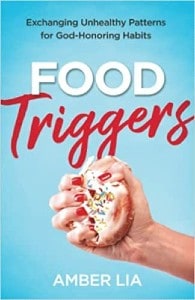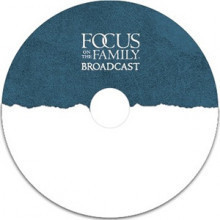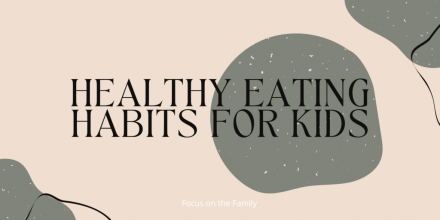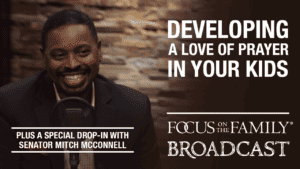Preview:
Amber Lia: You know, our enemy is gonna try to tell us that it’s too hard, that you can’t have victory. You’ve tried too many times before, it’s always gonna be the same. And that is not the God that we know. God says to us that we are a new creation. He says that He is an ever-present help in trouble. He says that His plans for us are good, to prosper us and not to harm us and so we are not powerless. We are not the victims of our past. We do not have to listen to shaming language, but we will need to exchange those unhealthy patterns with God-honoring habits. It starts with truth and then practical steps in the right direction.
John Fuller: That’s Amber Lia, and she joins us today on Focus on the Family with Jim Daly. Thank you for listening in. I’m John Fuller.
Jim Daly: Uh, John, what is your go-to food when you’re stressed out?
John: When I’m stressed out, if there is ice cream in the house, I will eat it.
Jim: Now how do you know this? I think I’m not connecting the dots between stress and eating.
John: Um-
Jim: I just like ice cream.
John: (laughs)
Jim: Basically, I’ll eat it ’cause I like it. It tastes good.
John: Well, maybe that’s why I eat it.
Jim: (laughs)
John: I’m not stressed, Jim. I’m fine.
Jim: (laughs) Is that a stress thing? I don’t know.
John: No, I, well, you asked the question.
Jim: (laughs)
John: And that’s what I would eat if I’m stressed out.
Jim: Well, okay. I’d say ice cream’s probably mine too. Which, chocolate or vanilla?
John: I’m a straight vanilla bean guy. Gimme a good-
Jim: Vanilla bean. It’s not bad.
John: … good vanilla bean.
Jim: … but chocolate’s good too.
John: It is.
Jim: Try it once in a while.
John: Okay.
Jim: Uh, you know, Paul writes in 1 Corinthians 10:31, “So whether you eat or drink or whatever you do, do all to the glory of God.” So I say, (laughs) okay, I’m gonna eat ice cream to the glory of God.
John: Well, that’s a good approach. I’ll, I’ll try that tonight.
Jim: (laughs) Try it tonight. Uh, but it does give us a little insight and we’re gonna learn a lot today. This might be one of those shows that’s an intervention for me. I don’t know, maybe the team has planned this. Uh, so I can identify-
John: Ah.
Jim: … that stress.
John: The cat is outta the bag, so to speak.
Jim: I eat certain things during stressful periods, I’m not sure. But I’m looking forward to, uh, talking with our great friend Amber Lia, who’s written a wonderful book, Food Triggers. I think most of us are gonna learn some things today.
John: Indeed. Uh, Amber has been here before. She’s a popular guest. She’s a certified health coach, uh, a blogger, a speaker, a work-from-home mom. She has four boys. Somehow she finds-
Jim: Wow.
John: … time to write great books. And, uh, as you said, Jim, uh, her book, Food Triggers: Exchanging Unhealthy Patterns for God-Honoring Habits, uh, that book forms the foundation for our conversation today. Get a copy of that from us here at the ministry, 1-800, the letter A, and the word FAMILY, or stop by focusonthefamily.com/broadcast.
Jim: Amber, welcome back.
Amber: Thank you so much for having me. I always love being here.
Jim: Now this is an off-the-cuff question. It just hit me. You probably know enough about food triggers that you can categorize people like me, like John, maybe like-
Amber: (laughs)
Jim: … Jean and Dena, I mean, seriously. I just don’t think of, uh, food being a kind of a pressure thing for me.
Amber: Yeah, well-
Jim: I would just eat ice cream ’cause I like it. It tastes good.
Amber: Yeah. Yeah. That-
Jim: Am I wrong?
Amber: … that makes a lot of sense. You’re not wrong.
Jim: (laughs)
Amber: And you’re actually hitting the nail on the head because culturally we have become fairly cavalier about food.
Jim: Oh, now you’re gettin’ me.
Amber: And our eating habits. (laughs)
Jim: (laughs) What does-
Amber: So you’re part of the norm.
Jim: … so what does that mean, “cavalier about your eating habits”? W- how would I need to change?
Amber: Well, statistically the majority of us are overweight or obese currently in Am- in America.
Jim: Okay. Now you’re hitting below the belt.
Amber: (laughs) I’m sorry. And listen, I-
Jim: (laughs)
Amber: … there’s no judgment because that was me just a few years ago, so I’m right there with you. I speak from a place of experience, but many of us are turning to food to cope and it has become normalized that we are using food for purposes that it was really never ultimately intended for.
Jim: Mm.
Amber: And that was where I found myself in a bit of a, a pit. And God has been faithful to help me get out of it.
Jim: So that old adage, uh, you know, “Don’t live to eat, eat to live.”
Amber: Right.
Jim: How does that apply in a biblical context?
Amber: Well, you know, anything that we make into an idol is going to be a path toward our demise. And what a lot of us don’t realize, what I didn’t realize is that I was using food for the wrong purposes and so it had become an idol for me. So any time that food is turned to for reasons other than its ideal purpose, which is fuel, you know, food is supposed to be for nutrition. It’s supposed to help us maintain our bodies, our temple. God calls us to take care of our bodies and to steward them well. And so when we start turning food into anything other than nourishment and fuel, and doesn’t mean we can’t enjoy it, we can. But for me, I was enjoying it too much and I was using it for emotional purposes and for other things that it was never intended to be used for. And that’s where I went wrong.
Jim: Describe that emotional need-meeting, if I can call it that. ‘Cause I’m not sure, you know, if you’re just bumping along during your day, I’m not sure I’m connecting with, do I do that? I don’t even, I’m trying to ask myself in my head right now, am I bumping along? I’m trying to get like three meals a day and I don’t snack that much.
Amber: Yeah. Well, a lot of us are eating at times and eating things that we didn’t plan for. So you go into the workspace, uh, rec room and all of a sudden you see all of these appealing treats and you just had a difficult meeting. Um, or you’ve had some kind of an interaction with a coworker and you had no intention of having a donut and now you’re having a donut. And-
Jim: See, I don’t connect-
Amber: (laughs)
Jim: … that to a bad work experience.
Amber: (laughs)
John: (laughs)
Jim: I just think it’s like having a donut.
Amber: Yeah.
John: (laughs)
Amber: Well, you know, the temptation is real.
Jim: (laughs)
Amber: And the difficulty is a lot of us get caught up in just the mindlessness of eating.
Jim: Okay.
Amber: We’re not being intentional.
Jim: That’s fair.
John: So it’s there. I might as well have one.
Amber: Right.
John: ‘Cause it’s there.
Amber: Yes. And we don’t take that connection.
John: Mm-hmm.
Amber: That there could even be something emotional going on.
Jim: Yeah. Uh, when you started your health journey, your friend, Tammy, raised a question for you, what did she ask you and why did that make such an impact?
Amber: Yes. I had known Tammy for many years. We had met at church in a Mommy and Me class, and we were both fairly fit at that time. 15 years later, fast-forward, many kids later and she and I both were at a place where we had allowed our weight to get outta control. And I was watching her, she was sharing online about her weight loss journey and I’m watching her, she’s getting healthier and I’m getting more miserable meanwhile. And so finally I just had a conversation with her. I said, “Tammy, you know, what are you doing? How do I get a hold of this in my own life?” And she said, “Look, I, I got rid of a diet mentality. I dialed in on what was the root cause of all of this. I found a simple plan that worked for me and you just need to make a decision and you need to find out why you want to get healthy. Why is this the right time?” And so I thought about that and I considered, why do I need to make a change? And there were several key things that came to the forefront for me as I considered, am I gonna keep going on this path toward becoming unhealthier and unhealthier or am I going to make a change? And I realized, you know, I’d wake up in the morning, I bet a lot of listeners feel this way. I’d open the closet door and it was just like dread. I hated getting dressed in the morning.
Jim: Hmm.
Amber: Because I was very uncomfortable. At the time, I was pushing 80 pounds excess weight for what was recommended medically for my body.
Jim: Mm-hmm.
Amber: So just getting dressed was uncomfortable. I didn’t like the way I looked in the mirror, though that was not the, the main reason I needed to get healthy. I really got to about two o’clock, the end of the day, you know, the afternoon, the school day with my kids, I was tired all the time. I realized that my kids were watching what I was eating. I was setting a pattern for them and none of that was okay with me. I needed to make some changes. So those ‘why’s were pretty strong for me, for my kid’s sake. And then I did feel some spiritual conviction too, that I wasn’t taking care of my body. You know, that verse that you mentioned earlier, whatever you do, whether you eat or drink, do it as unto the Lord. I was kind of doing lots of other ministry stuff as unto the Lord, but I wasn’t literally considering what I was eating or drinking.
John: Mm-hmm.
Jim: Okay. So one of the things I’m hearing clearly is you had to be motivated.
Amber: Yes.
Jim: I mean, you were in this funk, if I could call it that.
Amber: Yeah.
Jim: A fog.
Amber: Absolutely.
Jim: And you know, you’re just getting up every day, loathing looking in and getting dressed, and then by two o’clock, no energy. I hear all that.
Amber: Yes.
Jim: And then that motivation occurred. So what are the practical ways to achieve, uh, once you’ve got the realization that I’m not in a good place now, what do I have to do?
Amber: Yeah.
Jim: What are some of those practical things that we can do?
Amber: So I began to just look at my day, where were the times of day and the types of foods that I was eating that were triggers for me? And once I got clear on that, it made it much easier to put a practical change into place. So I noticed for me, okay, I’m tired by the end of the day. I have these four lovely boys, but by the time-
Jim: (laughs)
Amber: … they’re in bed, I’m wiped out. And I just wanted to sink onto the couch and reward myself for getting through the day. And so for me, like John, is ice cream, I would go to the freezer, open up the refrigerator, Guy would scoop the ice cream for me. And it wasn’t just a serving size, it was a nice big bowl full. And I would eat ice cream every night for years. And so I began to realize that if I keep doing that, obviously that’s not gonna be supportive of getting healthier. And so I had to say, okay, put a different plan in place. You have to put a little sign on the freezer, Amber, “Kitchen’s closed.” After dinner, brush your teeth so that you have that minty fresh feeling. (laughs) You don’t wanna sabotage that.
Jim: Oh, that’s a good idea.
Amber: And just, yeah. Just some simple practical things to remind me, hey, that old pattern isn’t serving you. You’re doing things differently now. The kitchen’s closed. And then internally, I also had to realize that the pull to ice cream, to sugar, to some of those foods was a numbing mechanism for me. As I spent time with the Lord and really tried to pray through, “Lord, why am I turning to food so often? Is it just the sugar or is there more to it?” I realized that I was not processing a lot of my emotions, grief in particular. I’d had a miscarriage a couple years earlier.
Jim: Wow.
Amber: And there were things that I just had not fully worked through with the Lord. And I knew that I needed to process that emotionally and that was a key turning point for me in my health journey.
Jim: And, and I think, I mean, I’m being a little whimsical with this, but you know, connecting the triggers to your pattern, I think for some of us is a little difficult, is what I’m trying to express. So how do we dig in and actually, you know, those are very, you know, very strong connections for you.
Amber: Yes.
Jim: The miscarriage and-
Amber: Yeah.
Jim: … you know, and I just don’t, I’m not in that place.
Amber: Mm-hmm.
Jim: So I’m obviously missing it.
Amber: Yeah.
Jim: Um, Puffy Cheetos are pretty good.
Amber: (laughs) Yeah.
Jim: Uh, but you know, we’re, and if you do that like one time a week, is that like taboo or-
Amber: Not necessarily. I think it just really depends again, on a pattern. And we, a lot of us know that the things that we’re eating are not helping us. A lot of us feel shame about that. And some of the ways that we can detect that is, are we eating food and then hiding the wrappers? Are we going through the drive through and not telling anybody before we get home? There are certain things that we do that actually are, you know, warning signs that, hey, this is being, you’re using food for temporary pleasure, for temporary satisfaction. But then what happens is then the shame comes.
Jim: Right.
Amber: And the conviction comes and the guilty feelings come and we’re worse off than when we started.
Jim: Okay. I think boredom eating-
John: Mm.
Jim: … might be more a category I can relate to. You know, you just, there’s nothing else to do.
Amber: Yeah.
Jim: So you’re not even hungry and you go-
Amber: Right.
Jim: … to the pantry and open it up and find those Puffy Cheetos.
Amber: It is a big one.
Jim: (laughs)
Amber: Yeah. The, the boredom for me, that started early on when I was a mom with young kids. I had a big transition in life, I had been working, now I’m home with kids, my husband is going off to work. And while I wanted to always be a mom, that was the thing I looked forward to most in my life, I actually found myself not enjoying the mundaneness of that everyday routine.
Jim: Uh-huh.
Amber: And I would, you know, get up, cook, clean, do the parenting. And I started to grow frustrated with my life. I thought, “Really? You know, that I don’t feel like I have a lot of purpose.” I mean, I know that raising my kids is an honor and that it’s a blessing. But try as I may, I was bored. I didn’t enjoy it like I thought I would. I loved seeing my kids discover their world. Meanwhile, my world started to shrink and it felt much smaller.
Jim: Huh.
Amber: And so that just turned to, well, I can cook. I’m home. I’ll just start cooking all these amazing things and I’ll try new recipes. It’s just something creative to do, fill the time. And before long, you know, somebody had to eat all that food. It was me.
Jim: (laughs)
Amber: I was the one that was there, the littles didn’t eat very much. So it put me on a trajectory of this pattern of overeating-
Jim: Ah.
Amber: … as well. And it was because I felt very purposeless at that time.
John: Mm. This is Focus on the Family with Jim Daly and our guest today is Amber Lia. We’re talking about her book Food Triggers: Exchanging Unhealthy Patterns for God-Honoring Habits. And we’ll encourage you to get a copy of that today. Our number is 800, the letter A and the word FAMILY, or stop by focusonthefamily.com/broadcast.
Jim: Describe how you get rid of the, the boredom eating though. How do you give it the boot?
Amber: Yeah.
Jim: And what do you replace it with?
Amber: Okay. So the ultimate food fight is exchanging unhealthy patterns for God-honoring habits. That was the ultimate food fight for me. So I had to look at that pattern of just cooking to try to fill a hole, which it didn’t really, just being bored and say, “Okay, Lord, I need to get back to my quiet time with you and be more intentional.” So when my kids took a nap, instead of baking, I went back to my Bible and I started to explore like, what is the thing that I’m seeking? What is the hunger that I’m really craving?
Jim: Huh.
Amber: You know, what is that thing? And so I began to realize that I just felt purposeless, even though I loved being a mom, I didn’t feel fulfilled. And I began to recognize that I had a lot of selfishness. That I was making everything about me, you know, that I wasn’t enjoying this instead of, again, doing everything as unto the Lord. You know, even that mundane task of taking care of the home and, and the joy of being with my kids, that there was great purpose in that, that that was a blessing. And I had to reorient my thinking and where God had me in that season and turned to Him instead of the food.
Jim: Yeah. That’s good. I mean, I, that makes sense to me. I mean, try something different than putting something in your mouth, right?
Amber: Yes. Yeah. Exactly. And so-
Jim: It, it is such a weird base habit though.
Amber: It is.
Jim: As a human being, why do we lean into that?
Amber: Because it’s what everybody around us does too. I mean, culturally, this is just what we do. Everything is so focused on food and it’s very accessible and it’s, everywhere you look, there is food. And so we are just conditioned to turn to food.
Jim: Yeah.
Amber: At every moment for everything, for every occasion. If we’re sad, we turn to food. If we’re bored, we turn to food. If we’re excited, we’re celebrating a win at a soccer game, who’s the snack parent? You know, who’s got all the treats? Everything is about food. At church, it’s food. Christmastime, it’s the cookie exchange. You know, we’re just very much focused on food as a culture.
Jim: It does say something about how God wired us though.
Amber: Mm-hmm. Yeah.
Jim: There is a uniqueness there that the bonding around a meal, et cetera, family.
Amber: Yes.
Jim: Evenings around dinner.
Amber: Yes.
Jim: And there’s something really good about eating together.
Amber: Yeah. And we’re designed for community, but when community means food, and that’s our focus, we can get off track. So we don’t wanna neglect getting together, we don’t wanna neglect being together, but we also want to be careful about what that culture looks like and how can we foster it to make it something that’s actually going to serve both our health journey and the other things we’re looking for in community, like the fellowship. So, you know, my husband, he had a, a group of, uh, gentlemen that would come to our house and we-
Jim: This is the fire pit.
Amber: Yes. The fire pit.
Jim: Oh, go- good. I wanted to ask you.
Amber: We had the fire pit and we would, you know, Hollywood’s a difficult place to be when you are a believer, and so they need encouragement. And so we would put on this lavish meal and a, just a good old-fashioned fire pit in the backyard overlooking the Valley. Beautiful, just some time of encouragement and prayer for these men working in Hollywood. And I would take a lot of pride in putting out this lavish spread of lasagna and garlic bread and, and all kinds of desserts. Multiple desserts, you know, lemon pie with lemons from my orchard. And I took a lot of pride in that.
Jim: You had me at lasagna. (laughs)
Amber: Yeah. Right? (laughs)
John: (laughs)
Amber: My Italian husband, that was a, a, you know-
Jim: (laughs) I love lasagna.
Amber: … a reward for him. Yeah. And so eventually though, when I started on my health journey and I made a decision to change and to really find my purpose instead of continuing to pick my poison, which was the food, and to really begin to look at how I even host events and and approach community, I had to change all that. You know, we started doing barbecued chicken and lovely salads and instead of all the desserts, you know, we would have a fruit platter with some yogurt dip. And it changed, and guess what? Nobody complained. Nobody said, “Oh, I miss the cheesy garlic bread.”
Jim: Isn’t that interesting?
Amber: (laughs)
John: Yeah.
Jim: And they came back the second and third time too.
Amber: They kept coming back because really they were there for the fellowship.
Jim: Mm.
Amber: That was their focus. I was trying to make it about me and about the food. And they didn’t really care about that, it was the gathering together that mattered.
Jim: Okay. So that’s good ’cause you’re hosting that, you can decide what to make and what to put out.
Amber: Yes.
Jim: And you can feel good about it.
Amber: Right.
Jim: But when you’re going to somebody else’s fire pit party-
Amber: Yeah.
Jim: … what do you do to manage, you know-
Amber: Yes.
Jim: … kinda looking for the things you can eat?
Amber: Yeah. So when you’re going to a gathering and you know there’s going to be food there, and likely it will be things that you may not want to eat. I say don’t go hungry. First of all, eat before you go. Choose something healthy that you feel good about. If it’s a potluck or something that you can contribute to, or even if someone’s willing to host, you can still offer to bring something. Bring something that is on whatever plan that you want to use or whatever type of diet that you may be, um, fostering in your home and, and contribute in a way that’s healthy. But ultimately, I try to make a goal at every gathering to be a blessing to others. To meet at least three new people, to engage in conversation and to stay away from the food table. I don’t need to make that my focus. It doesn’t have to be all about the birthday cake. Instead, what about the people that are there? What, what, in what ways can I notice the decor and the, and the fun things around me and all the other touches that the hostess, or host has, um, done to make this a, a lovely event and not so much care about the food?
Jim: No, it’s so true. Uh, last night, I mean, we had some guests over for dinner and I wasn’t feeling like dessert. I didn’t eat it. Um, we had a good meal and then Jean put cheesecake out for everybody.
Amber: Yeah.
Jim: And that’s the point you gotta say, eh, even if it’s on the plate in front of you-
Amber: Yes.
Jim: … you gotta kind of push it away.
Amber: Yeah.
Jim: I didn’t really have the desire, but I ended up eating it.
Amber: Yeah.
Jim: Just ’cause it was there.
Amber: It’s there. Yeah. And you know, I think a big thing that people miss out on when they’re going to gatherings or events, or they’ve just been asked over for dinner is to-
Jim: I wasn’t blaming Jean, by the way.
Amber: (laughs) Yeah, I know.
Jim: (laughs)
Amber: Um, but advocating for yourself, you know, saying to your host, “Hey, I just want you to know I’m, I’m on a health journey. I’m eating healthier these days. I do not wanna inconvenience you. Is there something maybe I could bring?” Oftentimes people will want to accommodate you.
Jim: Yeah.
Amber: You know, they’re there to bless you. And so advocate for yourself, don’t be afraid to let people know about the changes that you’re making.
Jim: Sticking with that stress eating. Why does that have such a hold on us again, we kind of started there-
Amber: Yeah.
Jim: … but we’re wrapping into the end here.
Amber: Yeah.
Jim: And what can we do about it?
Amber: So with stress, there’s a, a few things that we can do. A lot of us exercise to lose weight and exercise for me, my new way of thinking is that exercise is really for stress management. It released endorphins-
Jim: It does help.
Amber: Yeah, it does. So if we can think of exercise, not as a way to lose weight, let’s let our nutrition do that. But let’s think of exercise activity just to release endorphins to help with stress. But then also looking at that pattern of turning to food when we’re stressed and let’s replace it with a God-honoring habit. You know, maybe you just need to take a bubble bath. Maybe you need to put on some worship music and light a candle and just have some calming behaviors. There’s certain things that we can do practically to combat those patterns. But then also, again, always to go to the root of it and say, “Okay, Lord, you tell me to cast all my anxiety on you and I’m not doing that, so I need your help. I need you to help me cast my anxiety on you, to put in place some healthier habits that are gonna combat the stress.” And to recognize that God is for us and He doesn’t want us to operate from a place of feeling emotion, for our emotions to, um, enslave us. Our emotions should serve us. So paying attention-
Jim: Mm.
Amber: … to the stress, to the emotions, to all of those things. And then going back to God and saying, “Lord, help me to use these emotions, these circumstances for good and not for my harm.”
Jim: Yeah. I like the idea of finding ways to calm yourself down ’cause this environment that we’re in-
Amber: Yeah.
Jim: … always ratchets you up.
John: Mm-hmm.
Amber: Yes.
Jim: So to be intentional about finding ways to calm down-
Amber: Yes.
Jim: … that’s a good thing. And I’d say even a biblical thing, right?
Amber: Absolutely.
Jim: It’s kind of separating like Jesus did, separated from the crowds-
Amber: Yes.
Jim: … from time to time.
Amber: Right.
Jim: I mean, I’m sure the disciples were thinking, “But you’re God, you can do so much in this time.”
Amber: Mm-hmm.
Jim: “So just keep working, Lord.”
Amber: Yes.
Jim: I mean, that’s not healthy. He didn’t demonstrate that.
Amber: Right.
Jim: And He peeled off and-
Amber: He did.
Jim: … got kind of, uh, got His tank filled up again. Let me, let me ask you, in terms of emotions, you have a three-step process that you use. I think it’s stop, challenge, choose.
Amber: Yes.
Jim: Describe those.
Amber: Well, emotions beckon us to move quickly. They want us to react and to do it now.
Jim: That never happens to John. Right, John?
John: (laughs)
Amber: (laughs) And, and emotions are great, but they are not great if we’re often acting in the moment and we’re irrational about it. So the idea of stop, challenge, choose. And I like to even put, breathe in there.
John: Yeah.
Amber: Stop, challenge, breathe, and then make a better choice. Stop when the emotions rise, challenge them. Dig a little bit and say, okay, why am I feeling this way? Why is my body tensing? Why am I having the urge to drive towards the drive-through instead of home? What’s happening right here? Challenge it, dig into it. And then choose. Make a choice. I’m either going to choose to give in and to yield to this moment, or I’m gonna choose to honor what I’ve committed to in being healthy and remembering your ‘why’ in that moment. When I picture my kids, when I’m tempted by that cheesecake that Jean’s putting out, (laughs) I remind myself I’ve had cheesecake before. You know, I know what it tastes like. Why do I wanna have that right now? Is it just because it’s there? Is it because I’ve had a rough day? Well, I don’t need that. I’m gonna make a different choice. Or you know what? I’m fine emotionally, this is lovely. I want to honor my guests that they put this out for me. I can have a couple bites, I don’t have to go overboard and enjoy it. One meal is not gonna erase my whole healthy lifestyle. But being cognizant, being aware, being intentional, I think is what God calls us to do. That’s self-control.
Jim: You know, and I hadn’t thought of this, but it popped up in that example, the feeling that you had to finish everything.
Amber: Right. (laughs)
Jim: I mean, that’s where I make a mistake.
Amber: Yeah.
Jim: I mean, somehow, I don’t know how I got that beaten into my head.
Amber: Right.
Jim: But somehow, if something’s on your plate, you gotta eat it all.
Amber: Yeah. A lot of us grew up that way. (laughs)
Jim: (laughs) It’s so counterintuitive, right?
Amber: It is.
Jim: Why do I have to eat it all?
Amber: Yeah.
Jim: Well, because there’s starving children somewhere. What kind of argument is that?
Amber: I know. And globally right now, more people are actually dying from overeating than malnourishment, so those days are behind us.
Jim: Wow. Think of that.
Amber: And portions are out of control, we gotta dial it in.
Jim: And that’s a good way to do it though, isn’t it?
Amber: Mm-hmm. Yeah.
Jim: I’ve heard people that have done that. They just cut the meal in half.
Amber: Absolutely. It’s a great practice.
Jim: They’re having a doggy box or whatever they call it now.
Amber: Yeah. Start looking at labels.
Jim: Yeah.
Amber: You’ll see what a serving size actually is. My kids don’t eat out of a bag anymore. They’ll, if I hand ’em a bag, they’ll wait for a bowl ’cause they know mom’s gonna ask ’em to portion it out. (laughs)
Jim: And you know what’s so good about that? You start feeling the change.
Amber: Yes.
Jim: And it kind of reinforces the positive choices that you’re making.
Amber: That’s right.
Jim: Now you go to the wardrobe all the way back to the beginning-
Amber: That’s right.
Jim: … of this discussion when you talked-
Amber: Yeah.
Jim: … about opening your, your wardrobe.
Amber: Yeah.
Jim: And now you feel a little better. You’re a little more motivated.
Amber: Yeah.
Jim: For all the right reasons. So I-
Amber: Yeah.
Jim: … I think at the end here, it’s really speaking to that person, maybe you know, that woman who you described before that is loaded with guilt and shame and she might be in that spot. I don’t want to create the poundage, but it’s more, and guys too, I’m there. You know, I’m thankful I’ve lost about 30 pounds over the last couple years.
Amber: That’s great.
Jim: But I got more to go. But speak to that heavy laden heart-
Amber: Mm.
Jim: … you know, she doesn’t even know she can just put the left foot in front of the right foot. And “My husband is mentioning it way too much.”
Amber: Yeah. It feels overwhelming for many of us. And what I want listeners to know and understand is this doesn’t have to be hard, there are v- some very simple things that you can do. Very simple, practical exchanges that you can make that are going to give you a lot of freedom and movement in the right direction. Even just having eight eight ounce glasses of water every day, trying to protect seven hours of sleep, being intentional, enlisting an ally in your life that can journey with you on your health journey. There’s a lot of simple things that make a big difference.
Jim: Mm.
Amber: Don’t be overwhelmed. You know, our enemy’s gonna try to tell us that it’s too hard, that you can’t have victory. You’ve tried too many times before. It’s always gonna be the same. And that is not the God that we know. God says to us that we are a new creation. He says that He is an ever present help in trouble. He says that His plans for us are good, to prosper us and not to harm us. And so we are not powerless, we are not the victims of our past. We do not have to listen to shaming language, but we will need to exchange those unhealthy patterns with God-honoring habits. It starts with truth and then practical steps in the right direction but there is so much hope.
Jim: Yeah. Bring on the asparagus.
Amber: Bring it on.
Jim: (laughs)
John: (laughs)
Amber: Preferably roasted. (laughs)
Jim: Amber, this has been so good. Thank you so much, and what a great book, Food Triggers. And you’ve hit so many key issues. I mean, these are core things to who we are as human beings.
Amber: Yes.
Jim: That God created for the right direction.
Amber: Right.
Jim: And then we give up the truth for a lie.
Amber: Mm.
Jim: And thank you for the reminder that, uh, God’s way is a better way.
Amber: Yes. Thank you.
Jim: And I hope people will tap into Focus on the Family. Get a copy of this resource, it’s such a great book. Uh, be part of the ministry, make a donation of any amount, a one-time gift or even better, uh, monthly gift that helps us really stabilize the budget. And we’ll send you a copy of Amber’s book as our way of saying thank you for being part of the ministry.
John: Mm. Donate as you can when you call 800 the letter A and the word FAMILY. 800-232-6459 or stop by focus on the family.com/broadcast.
Jim: Amber, again, thanks for being with us.
Amber: Thank you for having me. It’s always such a blessing to be here. I hope your listeners will be encouraged.
Jim: Mm.
John: Well, join us next time as we hear from Les and Leslie Parrott, explaining how you can improve your marriage by learning how to disagree well.
Dr. Les Parrott: If you know how to fight a good fight, you can use conflict to your advantage. And rather than allow it to burn up your love life, allow it to enhance that.


















